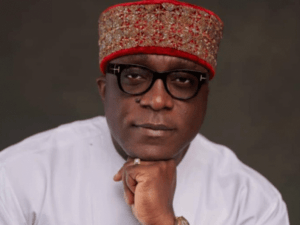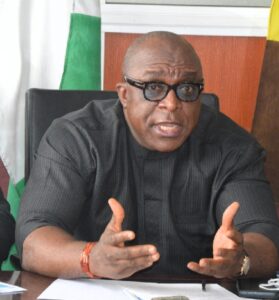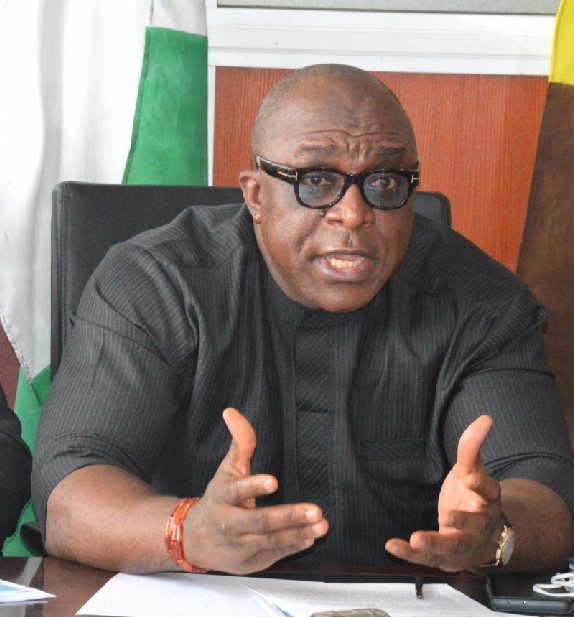
The CEO of United Nigeria Airlines, Dr. Obiora Okonkwo, in a recent media session with Aviation Correspondents, said the high cost of flight operations had made it difficult for airlines to operate profitably in Nigeria, noting that high cost of aviation fuel and foreign exchange has become very challenging for Nigerian carriers.
Inaugural flight
If you recall, February 12th, when we made our first flight out of Lagos to Abuja and Enugu, most people were surprised, because it was just less than 24 hours we had our final AOC (Air Operator Certificate) processed and we just took to the air. I could recall that it was about 6:00 pm on a day before when we had the final documentation and we sat down and said we must fly the next day. I don’t know if such has happened in the aviation history before but by 7:00 O’clock the next day we were already boarding our flight.
We opened our portal that night, we did not mind whether we sold any ticket or not but to our amazement, we almost had a full flight. And ever since then by the special grace of God, there has never been one day we are not flying. So by 12th of February we would have flown 365 days of the year. That is amazing. We have not achieved that without great mercy and grace, favour from God, but also with efforts of members of our team, who sometimes have to stay through the night to make sure we overcome whatever challenge for us to be on air the next day. So we are grateful to this our wonderful team, those who are with us today and a whole lot of those you don’t even see or you may not see but are very helpful to where we are today.
Within this one year we had Embraer ERJ 145 for a start, but we commenced our operation with two in the first instance, not long after, we came into full operation with the four aircraft. They have been all over the places doing what they know to do. In order to meet the demand of our passengers, we had introduced another aircraft, Airbus A320. Our staff strength has grown from strength to strength and we have been consistent with our policy to have certain percentage of experienced team, which is about 30 to 40 per cent and then 60 to 70 per cent of new hands, as our way of adding value to the industry; that is human capital development.
This is evident in our engineering department when we brought in some fresher who have been thoroughly groomed under the watchful eyes of our erudite and veteran director of maintenance and I am proud to say that a good number of these young men and women have been certified today; that in their different departments, they can now sign off aircraft. We are very proud of that. It has to take our internal training, our external training and their support, which was done fully by our own resources. That also can be seen with our cockpit crew. Within our cockpit crew, we have brought in certain number of pilots who may have finished training many years before we came into being, but have never had the opportunity to fly beyond their simulator training. We have taken a good number of these pilots, some of them we have given them type rating on our particular type of aircraft. We have brought them into training, we have seen some of them move from Flight Officers (FOs) to Senior Flight Officers (SFOs). We have also taken some SFOs giving them the necessary training they require to become even commanders. That is for me, a very, very important aspect of our being in the industry. A good number of them did not have that opportunity to have line training; they did not have that space in other airlines to be commanders. So in this area of human development, I think we will continue to contribute our quota.
Flight operations
On the passenger relationship, remembering that our mantra is “Flying To Unite”, we have been able to unite between 250,000 to 300,000 within this period. And to the glory of God, they had all taken up and landed safely. And then on other areas, we have also grown our operation from region to region, from city to city. Today we are covering South West of Nigeria, we are covering South East, we are covering South-South, and then the capital city. This has happened within one year. Because right now we are in Lagos, Abuja, and Port Harcourt; we are in Osubi which is Warri, we are in Asaba, we are in Bayelsa; the first airline to fly to Bayelsa on scheduled service. We are in Anambra, Enugu, Owerri. I may not know how it has been in the past, but some of the colleagues and friends in the industry have been saying this is quite commendable. I don’t know how you will evaluate that. But we are not dwelling on what we have been able to achieve, we have our eyes on where we are going. And where we are going is that by this time next year when we come here, we would have been telling you we have covered the entire six senatorial zones of Nigeria. And for that to happen, we would be increasing our fleet and at the same time expanding our workforce.
When that is done, it is important for you to know that we have all the blessings and all the capacities to do beyond the territories of Nigeria. So we have set a big task for ourselves that within the next couple of months, that we would have started our regional flight. When we say regional we are talking about West Africa. And hopefully, if we work harder on it, everything being equal by this time next year, we would have not only been discussing with you only about regional flight or zonal coverage, you may even know that we are already flying in some other countries in Africa beyond the sub-region. This is a Herculean task especially when this is being planned within this difficult operational environment. Yes, the operational environment is difficult in the sense that the industry has witnessed a whole lot of inconsistency in certain happenings.
High cost of operation
The first ever flight we operated, we paid for the first litre of aviation fuel (Jet A1) at N190 per litre. Within this one year period as at today (February 9, 2022), aviation fuel is N400 per litre. The first ticket we sold, the base price, was N23, 000 when aviation fuel was N190 per litre. The first foreign exchange transaction we had one year ago at the official rate was N340 per dollar. Today if it is available, it is N450 per dollar, when it is not available; the alternative market rate is N570 per dollar. This time last year when we operated alternative market was about N370 per dollar, the official market was N340.
But it might surprise you to know that while over a year ago at this rate of foreign exchange, today because of the market situation you still can but your ticket at N20, 000 to N21, 000 as base fare. So what it means is that as long as all the airlines are buying fuel from the same market, they are buying foreign exchange from the same condition, any ticket at this rate is being subsidized by the airline. Why do I say so? Aviation fuel depending on how it is applied and the type of aircraft could easily become 30 to 40 per cent of the cost component of your operation. And as you know, for every ticket you sell, you have 5 per cent deduction of ticket sales charge to NCAA. You have other deductions to NAMA (the Nigerian Airspace Management Agency), FAAN (the Federal airports Authority of Nigeria) and then airport owners.

So, as a matter of fact, by the time you remove all these deductions from this 20,000 that we are talking about, you have to use your money to finish some of them and then also take care of other operational needs. You could recall also that in 2000, you may have bought a ticket at N2000 but if you cast your mind back to that year; that 2000 was $100 based on the exchange rate. And it is important that we refer to this exchange rate in all these discussions because 99 per cent of aviation component is foreign exchange denominated; even the reason for the increase in fuel is because of foreign exchange because the product is imported. But from that 2000 up till now, the cost of aircraft has not reduced, salaries to staff are on the increase, all the other cost are on the increase, the airports are increasing their charges, landing charges are increasing but yet, this item we are talking about is still the same. So it is a very critical part in this industry and the aviation operators are really looking into that and are making all the efforts to find a solution to it because safety is very critical in aviation business.
But you cannot deal with safety in isolation from efficient operation, which has to come with proper financing of your operation. Because it is only when you are properly financed that you will be able to have the resources for spare parts, maintenance as at when due. And the only thing now that covers that aspect is only sales of tickets. And how much these tickets are sold is very, very important. And you see, aviation is a chain, there are a whole lot of players in that chain business. But the cashiers in that whole chain are the operators.
Passengers’ hostility to airlines
A good number of customers within the flying population don’t have much information on what it takes to operate a safe flight. It is not their business to know all the details, but at least you may have noticed a whole lot of hostilities from the customers at the airport. And these things do come with reaction on maybe flight delay, flight cancellation and so on. And surprisingly more often than not, people will sit back and tell you in London, it would not have happened. In America it would not have happened. I don’t know if this is the London or America we have all lived in and we visit. Because I have been in those countries, I have seen delayed flights. I have seen cancelled flights. I have been delayed in American airport for over 10 hours and I had only a bottle of water. We are not using that one as a standard but what it means is that these things could happen and for any airline not to be on air as at when due, there must be reasons beyond their control.
Because it only makes sense, if anybody you employed, from the engineers, to the cockpit, cabin crew, you employ them to make sure that your aircraft is in air, on time. So when that doesn’t happen there is need to have an understanding. And then when it does happen in those countries that they are referring to, nobody even raises an alarm. If you are flying you will just go and see a screen, this flight going to this place delayed for six hours. What do you do? You just find a place and make yourself comfortable. But here what happens? They look for the manager and jack him up. We have seen people going to break facilities at the airport because they have a flight to catch to the US; but when it happens in those countries they are going back to they won’t even go to the airline officials.
So I see that the security and safety of those who are working at the airport are very, very, critical. You have a role to play to appeal to the people. There are many things that can delay a flight that may not be as a result of the operator. It could be weather and for some of our travellers as long as they see an aircraft leaving from the airport of its location, it doesn’t matter to him or her where the destination is, even if it is going to Lagos. When we say we cannot go to Asaba, they will say, what about this one that just left? We have seen situation where you have an aircraft scheduled to go to Owerri but there is a flight delay to Asaba because of weather. The Asabapassengers might not allow you board Owerri passengers because they were there before Owerri. Why do you think that is happening? It is a challenge we all have to take up on ourselves because it is not good for the industry.






